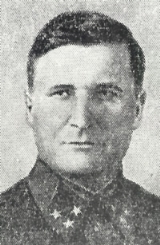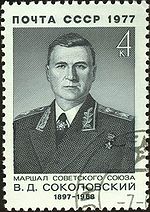
Vasily Sokolovsky
Encyclopedia
Vasily Danilovich Sokolovsky (July 21, 1897 - May 10, 1968) was a Soviet
military commander.
Sokolovsky was born into a peasant family in Kozliki, a small town in the province of Grodno, near Białystok in Poland
(then part of the Russian Empire
). He worked as a teacher in a rural school, where he took part in a number of protests and demonstrations against the Tsar. He joined the Red Army
in February 1918.
He began his formal military schooling in 1919, but was frequently called up by the Red Army and forced to leave his schoolwork. He graduated in 1921 and was made the chief of staff of a division stationed in Turkmenistan
. During a battle near Samarkand
, he was wounded, and subsequently decorated for bravery. After the Russian Civil War
, he held a number of staff positions, eventually becoming the chief of staff for the Moscow
Military District and then the Deputy Chief of the General Staff, the position he held at the beginning of the German invasion of the Soviet Union, Operation Barbarossa
.
In December 1941, when German
forces were a mere 20 kilometers from Moscow
, Sokolovsky was made the chief of staff of the Western Front
, where he was able to help co-ordinate the Soviet winter counter-attacks that pushed the Germans away from Moscow. He remained in this position until February 1943, when he became the commander of Western Front.
He led this front through the Kursk
battles, until April 1944, when the Western Front was broken into two, and Sokolovsky was made chief of staff of 1st Ukrainian Front
. He remained in this position until the end of the war. As the chief of staff of 1st Ukrainian, Sokolovsky helped plan and execute the Berlin
operation, among others. After the war, Sokolovsky was the deputy commander in chief of Soviet forces in East Germany, until July 3, 1946.
On that day Sokolovsky was promoted to the rank of Marshal of the Soviet Union
, and also made commander in chief of Soviet forces in East Germany. In 1949 he was made the Deputy Minister of Defense, a position he held until 1952, when he was made the Chief of the General Staff. In 1960, Sokolovsky was made the Inspector-General of the Ministry of Defense. He retained this position until his death on May 10, 1968.
Sokolovsky became widely known in the West with the publication in 1962 of Military Strategy, a book that contained rare detail on Soviet thinking about war, particularly nuclear war.
 Sokolovsky was a key member of the Soviet war command during World War II
Sokolovsky was a key member of the Soviet war command during World War II
as an excellent planner and a fine military leader. He was particularly well trusted by Marshal Georgy Zhukov
. The urn containing Sokolovsky’s ashes is buried in the Kremlin.
Sokolovsky was a prominent figure in William T. Vollmann
's 2005 National Book Award winning novel, Europe Central.
Soviet Union
The Soviet Union , officially the Union of Soviet Socialist Republics , was a constitutionally socialist state that existed in Eurasia between 1922 and 1991....
military commander.
Sokolovsky was born into a peasant family in Kozliki, a small town in the province of Grodno, near Białystok in Poland
Poland
Poland , officially the Republic of Poland , is a country in Central Europe bordered by Germany to the west; the Czech Republic and Slovakia to the south; Ukraine, Belarus and Lithuania to the east; and the Baltic Sea and Kaliningrad Oblast, a Russian exclave, to the north...
(then part of the Russian Empire
Russian Empire
The Russian Empire was a state that existed from 1721 until the Russian Revolution of 1917. It was the successor to the Tsardom of Russia and the predecessor of the Soviet Union...
). He worked as a teacher in a rural school, where he took part in a number of protests and demonstrations against the Tsar. He joined the Red Army
Red Army
The Workers' and Peasants' Red Army started out as the Soviet Union's revolutionary communist combat groups during the Russian Civil War of 1918-1922. It grew into the national army of the Soviet Union. By the 1930s the Red Army was among the largest armies in history.The "Red Army" name refers to...
in February 1918.
He began his formal military schooling in 1919, but was frequently called up by the Red Army and forced to leave his schoolwork. He graduated in 1921 and was made the chief of staff of a division stationed in Turkmenistan
Turkmenistan
Turkmenistan , formerly also known as Turkmenia is one of the Turkic states in Central Asia. Until 1991, it was a constituent republic of the Soviet Union, the Turkmen Soviet Socialist Republic . Turkmenistan is one of the six independent Turkic states...
. During a battle near Samarkand
Samarkand
Although a Persian-speaking region, it was not united politically with Iran most of the times between the disintegration of the Seleucid Empire and the Arab conquest . In the 6th century it was within the domain of the Turkic kingdom of the Göktürks.At the start of the 8th century Samarkand came...
, he was wounded, and subsequently decorated for bravery. After the Russian Civil War
Russian Civil War
The Russian Civil War was a multi-party war that occurred within the former Russian Empire after the Russian provisional government collapsed to the Soviets, under the domination of the Bolshevik party. Soviet forces first assumed power in Petrograd The Russian Civil War (1917–1923) was a...
, he held a number of staff positions, eventually becoming the chief of staff for the Moscow
Moscow
Moscow is the capital, the most populous city, and the most populous federal subject of Russia. The city is a major political, economic, cultural, scientific, religious, financial, educational, and transportation centre of Russia and the continent...
Military District and then the Deputy Chief of the General Staff, the position he held at the beginning of the German invasion of the Soviet Union, Operation Barbarossa
Operation Barbarossa
Operation Barbarossa was the code name for Germany's invasion of the Soviet Union during World War II that began on 22 June 1941. Over 4.5 million troops of the Axis powers invaded the USSR along a front., the largest invasion in the history of warfare...
.
In December 1941, when German
Wehrmacht
The Wehrmacht – from , to defend and , the might/power) were the unified armed forces of Nazi Germany from 1935 to 1945. It consisted of the Heer , the Kriegsmarine and the Luftwaffe .-Origin and use of the term:...
forces were a mere 20 kilometers from Moscow
Moscow
Moscow is the capital, the most populous city, and the most populous federal subject of Russia. The city is a major political, economic, cultural, scientific, religious, financial, educational, and transportation centre of Russia and the continent...
, Sokolovsky was made the chief of staff of the Western Front
Soviet Western Front
The Western Front was a Front of the Red Army, one of the Red Army Fronts during the Second World War. This sense of the term is different from the more general usage of military front which indicates a geographic area in wartime, although a Soviet Front usually operates within designated...
, where he was able to help co-ordinate the Soviet winter counter-attacks that pushed the Germans away from Moscow. He remained in this position until February 1943, when he became the commander of Western Front.
He led this front through the Kursk
Kursk
Kursk is a city and the administrative center of Kursk Oblast, Russia, located at the confluence of the Kur, Tuskar, and Seym Rivers. The area around Kursk was site of a turning point in the Russian-German struggle during World War II and the site of the largest tank battle in history...
battles, until April 1944, when the Western Front was broken into two, and Sokolovsky was made chief of staff of 1st Ukrainian Front
1st Ukrainian Front
The 1st Ukrainian Front was a front—a force the size of a Western Army group—of the Soviet Union's Red Army during the Second World War.-Wartime:...
. He remained in this position until the end of the war. As the chief of staff of 1st Ukrainian, Sokolovsky helped plan and execute the Berlin
Berlin
Berlin is the capital city of Germany and is one of the 16 states of Germany. With a population of 3.45 million people, Berlin is Germany's largest city. It is the second most populous city proper and the seventh most populous urban area in the European Union...
operation, among others. After the war, Sokolovsky was the deputy commander in chief of Soviet forces in East Germany, until July 3, 1946.
On that day Sokolovsky was promoted to the rank of Marshal of the Soviet Union
Marshal of the Soviet Union
Marshal of the Soviet Union was the de facto highest military rank of the Soviet Union. ....
, and also made commander in chief of Soviet forces in East Germany. In 1949 he was made the Deputy Minister of Defense, a position he held until 1952, when he was made the Chief of the General Staff. In 1960, Sokolovsky was made the Inspector-General of the Ministry of Defense. He retained this position until his death on May 10, 1968.
Sokolovsky became widely known in the West with the publication in 1962 of Military Strategy, a book that contained rare detail on Soviet thinking about war, particularly nuclear war.

World War II
World War II, or the Second World War , was a global conflict lasting from 1939 to 1945, involving most of the world's nations—including all of the great powers—eventually forming two opposing military alliances: the Allies and the Axis...
as an excellent planner and a fine military leader. He was particularly well trusted by Marshal Georgy Zhukov
Georgy Zhukov
Marshal of the Soviet Union Georgy Konstantinovich Zhukov , was a Russian career officer in the Red Army who, in the course of World War II, played a pivotal role in leading the Red Army through much of Eastern Europe to liberate the Soviet Union and other nations from the Axis Powers' occupation...
. The urn containing Sokolovsky’s ashes is buried in the Kremlin.
Sokolovsky was a prominent figure in William T. Vollmann
William T. Vollmann
William Tanner Vollmann is an American novelist, journalist, short story writer, essayist and winner of the National Book Award...
's 2005 National Book Award winning novel, Europe Central.

